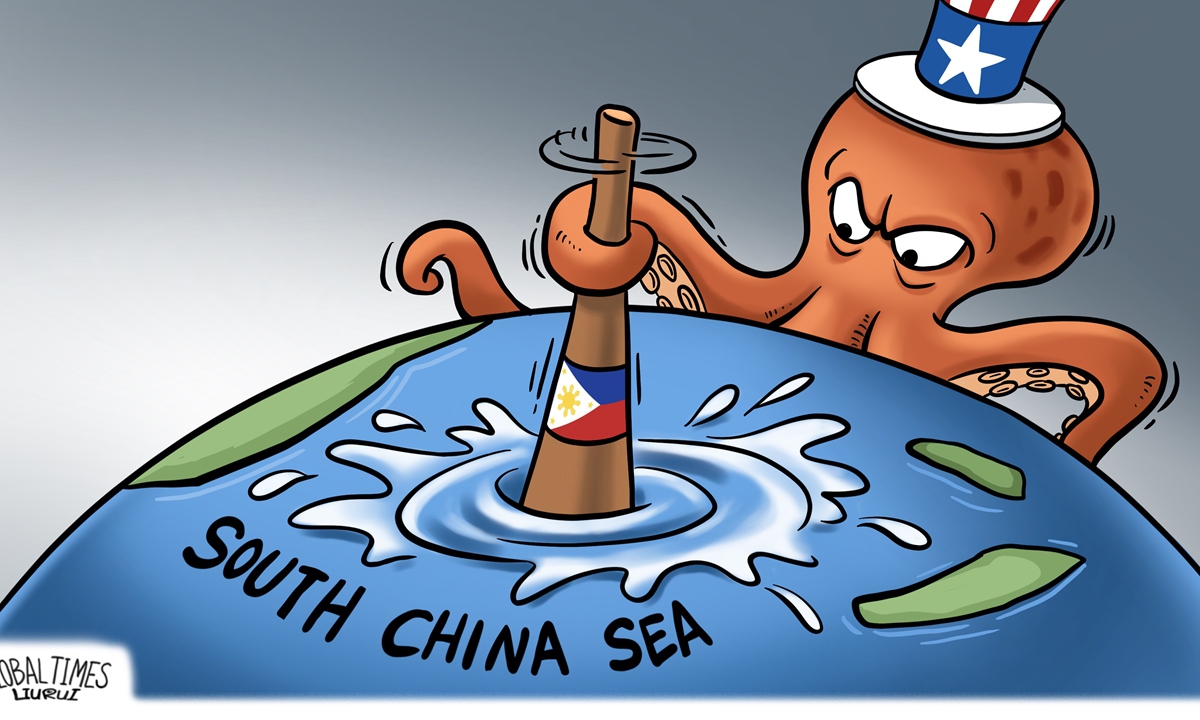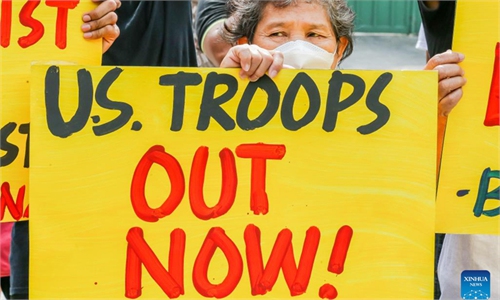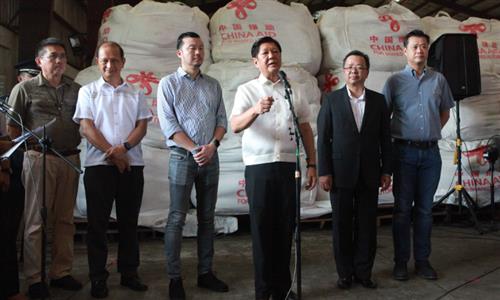China refutes Philippine's accusation of ‘floating barrier’ near Huangyan Island
Manila should realize potential danger of being used by the US: experts

US in South China Sea Illustration:Liu Rui/GT
The Chinese Foreign Ministry on Monday refuted the latest accusation made by the Philippines claiming the Chinese coast guard installing a "floating barrier" that "prevented Filipinos from entering and fishing in the area." Chinese Foreign Ministry said that a Philippine official vessel tried to enter China's territorial waters near Huangyan Island, and the actions of the Chinese coast guard were professional and restrained.
Chinese experts said that the reemergence of frictions between China and the Philippines are obviously driven by US instigation, as in the past few years, China has handled the issue in a very peaceful manner with the then administration of Rodrigo Duterte and successfully prevented disruptions by external forces, and warned that if Manila continues to follow the US' instructions to repeat the wrong approach of confronting China on the South China Sea issue, it would be extremely unwise and unfortunate.
Jay Tarriela, a Philippine coast guard spokesperson, posted on the social media platform X, formerly Twitter, on Sunday that Manila's coast guard and Bureau of Fisheries and Aquatic Resources "strongly condemn" the installation of a "floating barrier" by the China Coast Guard in a "disputed area of the South China Sea," saying it prevented "Philippine fishermen from entering and fishing in the area."
In response to the Philippines' accusation, Chinese Foreign Ministry spokesperson Wang Wenbin said that Huangyan Island has always been China's territory, and China has indisputable sovereignty over the island and its adjacent waters and sovereign rights and jurisdiction over relevant waters.
"On September 22, a vessel of the Bureau of Fisheries and Aquatic Resources of the Philippines, without China's permission, intruded into the adjacent waters of Huangyan Dao and attempted to enter its lagoon," Wang said at a routine press conference on Monday.
"China Coast Guard did what was necessary to block and drive away the Philippine vessel. The steps it took were professional and restrained," Wang noted.
Li Haidong, a professor at the China Foreign Affairs University, told the Global Times on Monday that "The current decision-makers of the Philippine government are clearly under the influence of the US, which has always tried to instigate conflicts and tensions in the South China Sea to serve its strategy of containing China."
In the past few years, China and the Philippines have established negotiation and communication mechanisms over the South China Sea issue, but unfortunately, under Washington's manipulation, Manila is now trying to deal with China with a more hostile approach, Li noted.
Chinese analysts warned that the Philippine government should realize the potential danger of being used by the US and learn from its lessons since 2016, as provocation and confrontation against China will bring them nothing but a heavy price, and the US will never pay for Manila's losses.
The US is now seeking a greater military presence in the region. According to Japanese media Nikkei Asia on Saturday, the US and the Philippines have begun discussions to expand America's military footprint in the eastern seaboard of the Philippines.
"General Brawner and I may make recommendations to our senior leaders for the consideration of additional sites but there is still work to do there before we get to that answer," Admiral John Aquilino, commander of the US Indo-Pacific Command, said at a press conference on September 14, referring to the chief of the Philippine Armed Forces Romeo Brawner. The US military has access to nine outposts in the Philippines, seven of which are located on Luzon island and Palawan island, Nikkei Asia reported.
The US and the Philippines may choose new sites in other areas, the sources told Nikkei Asia, including on the island of Samar and Leyte. The eastern part of Mindanao as well as Bicol province on Luzon island are also under consideration, while one of the sources cautioned that talks are "preliminary."
Zhuo Hua, an international affairs expert at the School of International Relations and Diplomacy of Beijing Foreign Studies University, said that the intention of the US to rapidly expand and enhance military cooperation with the Philippines, and to contain China in the region through more military activities and a greater presence, is very clear.
"This kind of plan aims to utilize the Philippines' unique geopolitical position, serving as a forward military outpost for the US to enhance its deterrence against China during peacetime, and as a base to support and even launch US military operations against China during wartime. The US plan will undoubtedly promote militarization in the Asia-Pacific region, attempting to turn the Asia-Pacific region, which has long maintained overall peace, into a powder keg. The risk of the Philippines becoming the blasting fuse is increasing," Zhuo noted.



